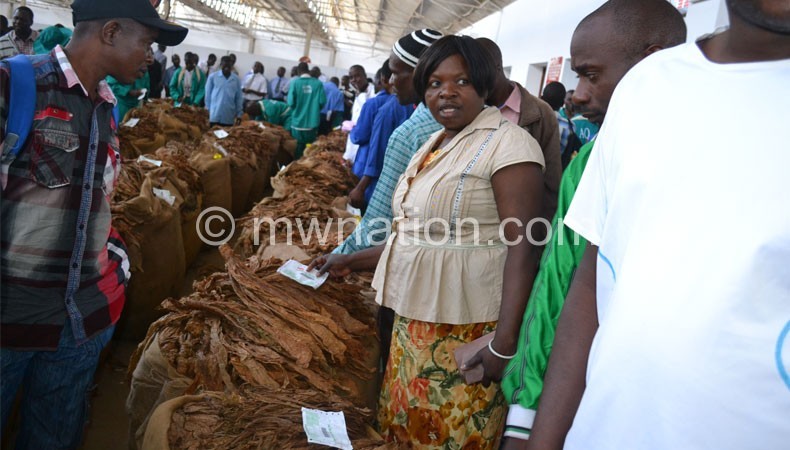Tobacco buyers prioritise sponsored growers
Tobacco Association of Malawi (Tama) has expressed concern about tobacco buying companies that are prioritising purchasing leaf from sponsored growers at the expense of non-funded growers.
Tama chief executive officer Graham Kunimba told Business News last week that the association is currently lobbying buyers to treat all growers as equals.

“We are not happy with what tobacco buying companies sponsoring growers under contract are doing in prioritising farmers who are funded while rejecting leaf of non-funded growers,” he said.
Kunimba said buyers communicated to the association that they would like to cut down on compound interest rates as the funded farmers will repay more if they wait longer to sell their leaf.
He said the buyers want to fully recover their loans from funded growers for them not to register losses.
However, Kunimba said the tobacco growers’ body has asked buyers to increase their daily intake as auction floors have the capacity to hold larger volumes of tobacco instead of sending them back to be bought at a later date, compromising on quality.
Some non-funded farmers clubs in Rumphi that signed contracts with Alliance One Tobacco (Malawi) said their 36 bales of burley tobacco were rejected.
One of the club’s member, said when their leaf was delivered to Mzuzu Auction Floors, it was sent back because the company wanted to first buy tobacco from funded growers.
“The delay has affected us and the quality of our leaf has been compromised,” said the grower.
But Alliance One Tobacco (Malawi) Limited corporate affairs manager Francoise Malila said the company prioritises buying tobacco from funded growers to catch up with the non-funded growers’ leaf which has been coming to the floors at a faster pace since the marketing season started.
“This catch up exercise was deemed to take three weeks during which the portion of funded was going to be greater than that of the non-funded,” she said, adding that the company communicated to the growers’ associations that it deals with.
Malila, however, said the company will purchase all tobacco that had been contracted in line with the contract agreement.
“As Alliance One, we purchase our volumes from funded and non-funded growers and our current mix is 50 percent sponsored and 50 percent non-sponsored,” she said.
Malila said sales have been faster this year than any season in record, with 55 percent of the crop grown has already been purchased.
She said after 10 weeks of sales, 50 million kilogrammes (kg) of tobacco on contract has been sold compared to 36 million kg during the same period last year. This is also compared to 26 millon kg in 2012 and 10 million kg in 2011, according to Malila.
With Integrated Production System (IPS), tobacco buyers facilitate tobacco growers’ access to farm input loans, including an input package for maize and legumes.
The farmers are being contracted as clubs to effectively facilitate training and access to loans, among others.
The Malawi Government approved, in principle, the introduction of IPS in October 2011.
IPS was, however, adopted in May 2012 with 80 percent of the total volume on IPS and 20 percent on auction to address fluctuations in leaf pricing, declining global demand due to emerging strict global regulatory regimes and global over supply, among others.





